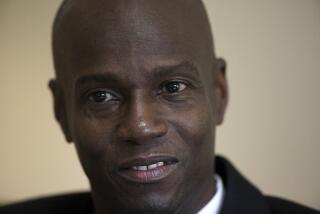U.S. Detaining Suspect in Killing of Salvador Bishop
- Share via
WASHINGTON — U.S. marshals have detained a prime suspect in the 1980 assassination of the Roman Catholic archbishop of San Salvador in the wake of Salvadoran President Jose Napoleon Duarte’s announcement that his government has solved the slaying and knows the killer’s identity, the U.S. Marshals Service said Tuesday.
The suspect, Alvaro Rafael Saravia, is a former Salvadoran army captain allegedly linked to El Salvador’s “death squads” and a longtime associate of former army Maj. Roberto D’Aubuisson, the rightist leader accused by Duarte of ordering the slaying.
In San Salvador, the Associated Press reported that a judge began proceedings Tuesday to strip D’Aubuisson of his parliamentary immunity so he can be charged in connection with the assassination. D’Aubuisson is a deputy in the legislature for the ultra-right National Republican Alliance, which he heads.
D’Aubuisson has denied any link to the killing, saying the allegation was politically motivated.
Saravia was apprehended in Miami on Monday night after being lured from his residence on a false accident report.
He is being held at the Immigration and Naturalization Service’s Krome detention center in Miami on charges of overstaying his tourist visa, which expired in September, 1985. It is anticipated that El Salvador will request his extradition in the slaying of Archbishop Oscar Arnulfo Romero, federal law enforcement sources said.
Romero’s slaying on March 24, 1980, is one of the most politically charged rights cases in El Salvador. The extradition request likely will be based on testimony by an admitted participant in the assassination, Amado Antonio Garay, that he had driven a gunman to the chapel where Romero was saying Mass and that the gunman, whom Garay could not name, fired a rifle from the back seat. Garay, in the testimony submitted to a Salvadoran court, said Saravia had sent him and the triggerman to the chapel.
Saravia’s Miami residence had been under surveillance by the marshals for 10 days after Salvadoran officials indicated that they planned to prosecute him and other unnamed individuals for Romero’s murder, the law enforcement sources said.
The Justice Department’s office of international affairs provided the marshals with a photograph, background information on Saravia and tips on where he might be staying.
After Duarte spoke out about the case last Saturday, the marshals decided to detain Saravia, believing that he might flee the area.
In apprehending Saravia, who was not armed, the marshals used their standard technique of luring the suspect from the house, because arrests outside generally are safer and because they lacked a warrant to enter the residence, a law enforcement source said. Police told Saravia that a car registered to his address had been involved in an accident and they asked him to step outside and show them his auto registration papers.
The United States obtained what it considered “conclusive” evidence of D’Aubuisson’s role in the Romero killing as long as five years ago and forwarded that information to the Duarte government after it took power, one knowledgeable American official said Tuesday.
According to the official, who refused to be named, a witness to the planning of Romero’s death told U.S. officials that D’Aubuisson had ordered the killing personally. While U.S. officials considered the information accurate, it fell short of the standard of proof needed for an arrest or prosecution.
Times staff writer Michael Wines contributed to this article.
More to Read
Sign up for Essential California
The most important California stories and recommendations in your inbox every morning.
You may occasionally receive promotional content from the Los Angeles Times.










